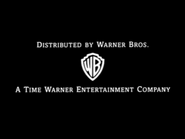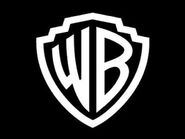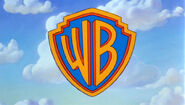Warner Bros. Entertainment Inc., commonly referred to as Warner Bros. and abbreviated as WB, is an American entertainment company headquartered in Burbank, California and a subsidiary of AT&T's WarnerMedia.
History[]
Early history[]
The company's name originated from the four founding Warner brothers (born Wonskolaser or Wonsal before Anglicization): Harry, Albert, Sam, and Jack Warner. Harry, Albert and Sam emigrated as young children with their parents to Canada from Krasnosielc, Poland.
Jack, the youngest brother, was born in London, Ontario. The three elder brothers began in the movie theater business, having acquired a movie projector with which they showed films in the mining towns of Pennsylvania and Ohio. In the beginning, Sam and Albert Warner invested $150 to present Life of an American Fireman and The Great Train Robbery. They opened their first theater, the Cascade, in New Castle, Pennsylvania, in 1903.
When the original building was in danger of being demolished, the modern Warner Bros. called the current building owners, and arranged to save it. The owners noted people across the country had asked them to protect it for its historical significance.
In 1904, the Warners founded the Pittsburgh-based Duquesne Amusement & Supply Company, to distribute films. In 1912, Harry Warner hired an auditor named Paul Ashley Chase. By the time of World War I they had begun producing films. In 1918 they opened the first Warner Brothers Studio on Sunset Boulevard in Hollywood. Sam and Jack produced the pictures, while Harry and Albert, along with their auditor and now controller Chase, handled finance and distribution in New York City. During World War I their first nationally syndicated film, My Four Years in Germany, based on a popular book by former ambassador James W. Gerard, was released. On April 4, 1923, with help from money loaned to Harry by his banker Motley Flint, they formally incorporated as Warner Bros. Pictures, Incorporated.
Theatrical cartoons[]
To compete against Walt Disney's short cartoons, Warner Bros. became interested in developing a series of animated shorts to promote their music. They had recently acquired Brunswick Records along with four music publishers for US$28 million and were eager to promote this material for the sales of sheet music and phonograph records. Warner made a deal with Leon Schlesinger to produce cartoons for them. Schlesinger hired Rudolf Ising and Hugh Harman to produce the first series of cartoons. Schlesinger was impressed by Harman's and Ising's 1929 pilot cartoon, Bosko, The Talk-Ink Kid. The first cartoon Warner Bros. would distribute would be the Looney Tunes short Sinkin' in the Bathtub (released April 19, 1930).
Harman and Ising would part ways with Schlesinger in 1933 following budget issues, and Schlesinger would establish Leon Schlesinger Productions as a result. Schlesinger would sell the studio to Warner Bros. in 1944 and it would be renamed Warner Bros. Cartoons. The studio would close in 1962 and its last cartoon would be released in 1964.
Warner Bros. would open a new animation studio, Warner Bros.-Seven Arts Animation, in 1967. They would close it in 1969 after the completion of the last few Looney Tunes and Merrie Melodies cartoons.




